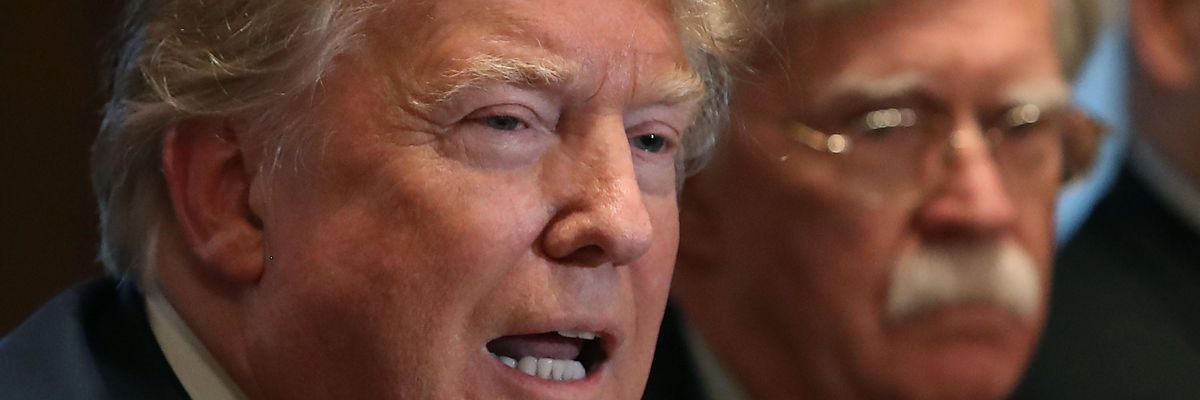With war 'fanatic' John Bolton in the White House for the first time as his new national security advisor on Monday night, President Donald Trump gathered his military advisors together as lawmakers and anti-war policy experts raised warnings that any move by the president to attack Syria in the wake of a suspected chemical attack over the weekend would not only be extremely "dangerous" but also "illegal."
"If we want to end the war and hold the perpetrators of war crimes accountable, than yet another US military intervention into Syria is not the way to do that. It may make people feel good temporarily, but it won't bring justice or peace to Syria." --Stephen Miles, Win Without War"President Trump's threat to attack Syrian forces in response to a chemical weapons attack is a reckless, knee jerk reaction to a complex and dangerous situation," Martin said. "There hasn't been an independent investigation into the chemical weapons attack, Congress still hasn't debated or authorized the use of force in Syria, and there is still no international legal basis for U.S. military action in Syria."
Before closing the doors for Monday night's White House strategy sessions, Trump told reporters, "We have a lot of options militarily, and we'll be letting you know pretty soon. Probably after the fact."
But the stakes of such an attack, warned Martin, are extremely high.
"Trump's 'shoot first, ask questions later' approach to foreign policy is the opposite of what's needed in Syria," he warned. "Escalation begets escalation, and with both Iran and Russia deeply involved in the Syrian conflict, there's no telling where escalation might lead us."
Democratic lawmakers also raised objections to a unilateral military action and warned the president against ordering any attacks without the explicit authorization of Congress.
"Before President Trump even considers taking the United States down a path of unilateral military action, the American people need answers. What does this administration hope to accomplish? What's the end game?" asked Rep. Jim McGovern (D-Mass.) on Monday. "Are we moving from fighting ISIS to fighting Assad outright? Or are we withdrawing our troops and airpower from the region? In the space of a few days, the president has said both."
Even with congressional approval, however, others issued reminders that a military attack on the Syrian government would by the U.S. would be a violation of international law.
Despite claims by Trump, administration officials, and other lawmakers that U.S. military action is necessary to protect the lives of Syrians, informed critics warn that nothing is more tired and hypocritical than the declarations of "humanitarian interventionists" who--after more than 16 years fighting wars in the Middle East and South Asia--still think that bombings and weapons shipments from outside forces will result in peace and security for people in the region:
"At the end of the day," wrote Win Without War's Stephen Miles as part of a Twitter thread Monday evening, "there are no easy answers for Syria. I can sympathize with those members of Congress and others who are disgusted not just by this latest attack but by our collective failure to stop the war."
He added, "But if we want to end the war and hold the perpetrators of war crimes accountable, than yet another US military intervention into Syria is not the way to do that. It may make people feel good temporarily, but it won't bring justice or peace to Syria."
According to the Friends Committee on National Legislation, the pro-peace Quaker lobby group, it should be clear to all by now--after nearly seven years of war, slaughter, and displacement--that "no military solution exists to the crisis" in Syria. As such, the FCNL urges that instead of war and deeper entrenchment, the U.S. should adopt the following set of policies to help foment a peaceful solution in Syria and curb the suffering of its people:
* The U.S. should fully support the ongoing investigation of the chemical weapon attacks by the Organization for the Prohibition of Chemical Weapons and work with the international community to bring the perpetrators to justice.
* Congress should take back its constitutional authority to decide if, when, and for how long the U.S. goes to war. Congress should demand that the administration seek an Authorization for the Use of Military Force before pursuing any military action. We urge members of Congress to vote against any further military action in Syria.
* The Trump administration should immediately meet with Russia, Iran, Turkey, and the Gulf States to revive international negotiations that will lead to a diplomatic solution.
* The U.S. should promptly increase resettlement of Syrian refugees in the U.S. and send more humanitarian aid to the region. Years of direct U.S. military intervention, support of extremist armed groups, and weapons shipments to anti-government rebels in Syria have only added fuel to the fire and put Syrian civilians in greater danger. This militarized approach cannot stop the Assad regime's systematic atrocities.
And as Peace Action's Martin advised: "Instead of escalating our involvement in Syria by responding to an unlawful chemical attack with unlawful strikes, the president should support an independent investigation into the chemical attack and pursue diplomatic and humanitarian strategies for addressing individual war crimes as well as the conflict as a whole. Trump should also act on his stated desire to withdraw U.S. forces from Syria without delay, which would help de-escalate the conflict and give the U.S. more credibility in the diplomatic push to end the war."

